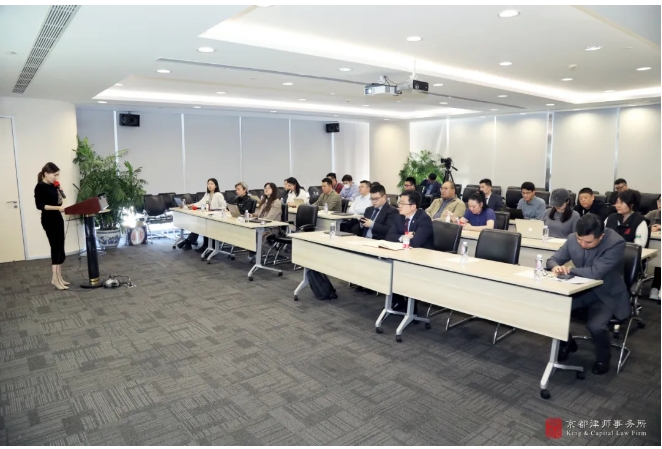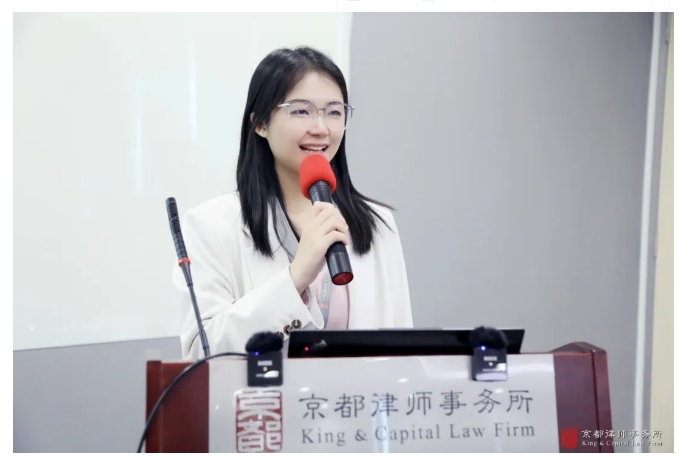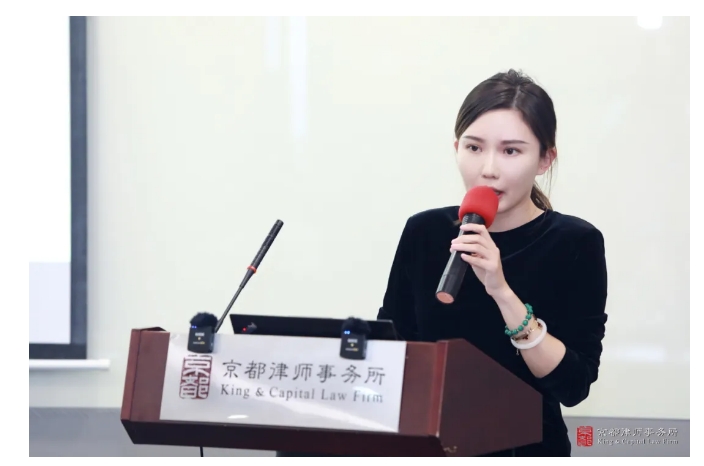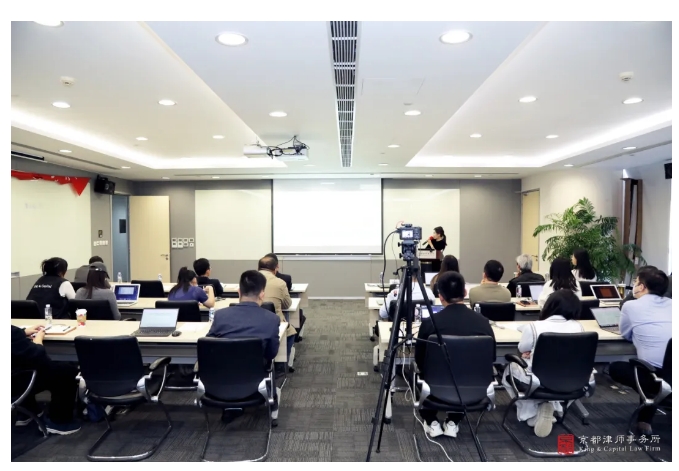On November 29, 2024, the ninth issue of the lecture series of “Talking about Criminal Cases” of the Criminal Department of Kyoto Law Firm was successfully held, and the topic of this seminar was “Intersection of Criminal, Civil and Bank Practices in Cases Involving Listed Companies”.

This event was conducted by Mr. Wang Jiaming, a partner of Kyoto Law Firm, and moderated by Mr. Chen Sainan. Dr. Wang has a PhD in Criminal Procedure Law from the Chinese Academy of Social Sciences, and has accumulated profound legal knowledge and rich practical experience in criminal defense and representation, criminal cases involving enterprises and crisis response, corporate investigation and anti-corruption, and protection of entrepreneurs' rights and interests, etc., and has especially excelled in the handling of criminal and cross-cutting criminal and civil cases.

Sai-Nan Chen

Wang Jiaming
The event kicked off with an opening speech by the host, Mr. Chen Sai-Nan, followed by an in-depth analysis of criminal and civil cross-practice issues in cases involving listed companies by Mr. Wang Jiaming. In recent years, the Securities and Futures Commission (SFC) has implemented strict supervision of listed companies, upholding a zero-tolerance attitude towards the capital market, and the purging efforts have reached an unprecedented level. This series of initiatives not only effectively remedied the capital market in the course of decades of development of the accumulated chaos, but also severely investigated a large number of listed companies in violation of the law cases, greatly enhanced investor confidence in the capital market, and vigorously promote the healthy and stable operation of the capital market.
In capital market activities, in addition to the frequent occurrence of typical securities crimes such as insider trading and securities market manipulation, criminal cases triggered by listed companies' equity mergers and acquisitions betting activities have also emerged in recent years. In a number of publicly disclosed cases of contract fraud caused by listed companies' M&A betting, it is due to the implementation of financial falsification by the subject of M&A, resulting in the inflated value of equity M&A, which ultimately led to the listed company being caught in the scam and sustaining a huge amount of financial losses. In such cases, there are two key issues worth exploring in depth: first, financial fraud triggered by civil fraud and contract fraud boundaries in the end how to define; second, due to the merged and acquired enterprise financial fraud generated by the financial data inaccuracies, which in turn triggered by the disclosure of irregularities in the administrative penalty standard in the end how to determine.
First of all, this kind of case belongs to the more typical criminal-civilian cross-case type. From the practical level, it is usually believed that the core difference between civil fraud and criminal fraud is the existence of illegal possession of the subjective purpose. In the case of listed company equity mergers and acquisitions, the merged enterprise often through inflated profits, inflated accounts receivable, inflated revenue and other means of financial fraud, maliciously inflate the equity valuation, in order to seek more equity transfer payments. In this case, the behavioral characteristics of fabricating facts and concealing the truth necessary for contract fraud are already in place, while the determination of the purpose of unlawful appropriation usually requires comprehensive consideration of the use of equity merger and acquisition funds, specific purposes and other factors. However, such cases face a prominent problem is that the lack of uniform judicial standards on financial forgery contract fraud to be clearly defined, resulting in practice to deal with such cases involving fraud or fraud, the idea of large differences. Some cases ruled that by forging financial documents, false contracts, cover up the company's true operating conditions, false packaging and other means, resulting in a significantly inflated amount of equity value assessment, fraudulent transfer of equity in listed companies constitutes contract fraud. However, there are also views that, to determine whether to constitute contract fraud, should be considered comprehensively the quality and scale of the acquired company itself, if the company's own operating conditions, assets and capital status is relatively stable, only a certain degree of financial adjustment, can not be unilaterally identified as constituting the crime of contract fraud. Therefore, in the practical operation, still need to combine the different circumstances of the specific case for accurate determination and judgment.
Second, should not be underestimated is the information disclosure responsibility of listed companies. In this kind of case, even if the listed company suffered from the criminal offense of fraud, its information disclosure responsibility will not be exempted. Although the “listed companies information disclosure management measures” and “information disclosure violations of administrative responsibility rules” clearly on the information disclosure violations of the investigation and punishment standards, but in practice, it is difficult because the listed company subjectively does not have information disclosure violations of the intention, will be exempted from information disclosure violations of the responsibility. At the same time, in the case of listed companies mergers and acquisitions cheated, the listed company has suffered huge losses due to the crime, as a victim of criminal cases, but still have to be in the administrative procedures because of the determination of the failure to fulfill the obligations of diligence and due diligence and again suffer punishment, which to a certain extent, the listed company has caused “secondary injury”, this kind of “secondary injury”. This “secondary injury” type of investigation and handling behavior deserves in-depth reflection and prudent consideration.
At the end of the first part of the lecture, the host, Mr. Chen Sainan, expressed his heartfelt thanks to Mr. Wang Jiaming for his wonderful sharing, and invited the attorneys on the spot to carry out more in-depth exchanges and discussions around the cross-cutting issues of criminal, civil and criminal behavior. Mr. Sun Guangzhi, senior partner of Kyoto Law Firm, Mr. Peng Jiyue, senior partner and partner-in-charge of the Criminal Department 3, and other guests at the event participated in the discussion and shared their valuable experience in criminal defense practice.
At the end of the activity, the host, Mr. Chen Sainan, expressed his sincere gratitude to all the attorneys for their active participation and enthusiastic interaction, and hoped that everyone could continue to pay attention to the “Criminal Defense Talk” activity of the Criminal Department III, participate in it, share their experiences, exchange and learn from each other, and practice ” Pursue excellence, live up to the promise”.

Follow-up activities:
The series of activities of “criminal defense” is a column specially set up by the Criminal Department of Kyoto Law Firm to strengthen internal communication, improve the practical ability of lawyers in criminal defense, and enhance the influence of the firm's criminal defense brand. The column aims to promote the exchange and cooperation between the head office of Kyoto and the branch, the firm and the peers, experts and scholars, between the departments within the firm. The “Criminal Defense Talk” activity will be held once a month, and the next activity will continue to invite professionals to share and discuss.



